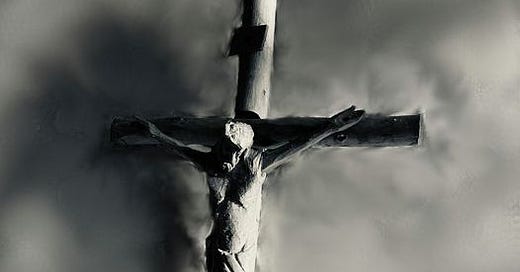I had cancer. I was immuno-compromised. COVID had shut down the world and we shared the house with two dying parents and a four year old grandchild.
I wasn’t excommunicated from the church even though I was not attending services. I was just non-communicated unless we thought someone in the house was about to die. So, the wilderness of my illness and house became my “domestic church” for nearly three years.
My cancer formed the rubrics of “high, holy days” of my church: Doctor's appointments became my liturgical calendar of “days of obligation”. Preparations for scopes, surgeries and bloodwork became my fasting regulations. Lists of my symptoms, and pains were my confessions to white robed healers before they “laid hands” on me. An ostomy bag was my Lent.
But my domestic church, like everyone else’s, also had a daily rhythm, an “Ordinary Time”, where the days have a regularity, a structure that only varies at the insertion of a prescribed fast or feast or special appointed season.
My daily domestic liturgy began with the litanies of my father’s recitiation of lists: of medications, what he ate for breakfast, of what he fed Mom, what he bought at Walmart on sale, then came the hymns and homilies of Fox News and AON, his repetitive complaints about the Democrats, the day-time caregivers, my cooking, my wife, and the church… “again and again”… but never in peace.
My confessions were heard by my wife and children, my inner circle of real-life friends, and by strangers on Facebook.
My communion was a shared supper, alternately unsatisfactory to whoever did not cook it. Not our favorite kind of food, too spicy, too over-done, too bland, wrong side dishes.
My vigil was watching and listening to a baby monitor hidden in their room to be sure dad wasn’t yelling at his demented wife, that no one was choking or falling out of bed.
My chant was, “You’re in your own bedroom, you live with me and Peggy, you’re safe…” 40x a night to my Mom.
My fast was biting my tongue, eating what was served up, foregoing my desires, letting things go, making peace at sometimes great expense, giving in, sometimes just giving up.
My epiclesis was, “God, please make this daily bread we’re sharing be the body of Christ crucified for the sake of us all.”
And, “And make this wine at 11:35pm after the last changing of my mother to be the blood of Christ for the sake of the peace of my spirit.”
In the wilderness of my home I learned this: Even though I was apart from the church, its services and its sacraments, I was not excommunicated from God nor from the sacramentality of life.
By (reluctantly) embracing my wilderness I was drawn in to a liturgy and communion that The Divine Liturgy reminds us exists within our ordinary lives, the same ordinary, earthly life Christ lived in our flesh and offered up to the Father, but we do not pay attention to, or see, or practice: Laying aside all earthly cares, prayers for everyone including those who trespass against us, for the sick and suffering, captives, for every thing and every one both good and evil, being grateful and gracious, forgiving, long suffering, patient, and above all merciful as God is merciful toward us.
In the liturgy of life, I found I was surrounded by sacredness. I was immersed in sacrament that only demanded I open my eyes, participate consciously in it and offer it up to God: the sacrament of being silent, of being gracious, of eating overcooked food, of changing crappy diapers, of listening attentively, of sleepless nights, of submitting to humiliating medical interventions to stay alive for the sake of family, of a kind word, of doing dishes, of a smile. I also found that life, like the sacraments of the church can sometimes feel “magical” but they are not magic. All sacraments can be received unworthily, just as the circumstances of our lives can be received and lived unworthily. In either case the sacraments can be to our condemnation. It is by our attention to and participation in them in love that they are to our repentance and “magically” transform us.
After three years in the wilderness I found that being Christlike is not about how many services I attend, how many prayers I can recite by rote, what I eat or don't eat and when according to an ecclesial calendar. The demons are at every church service and they never eat.
The one thing demons never do is embrace a cross, lay down their desires, endure suffering, and bury their egos for the sake of love.
In the fear of God, in faith and love draw near… to the cross of the brutal beauty of your life, and if you have opportunity, as well as to the chalice.




Occasionally someone is so on point...they nail it... Whatever it is...to a degree that I can't really come up with any response or anything to add or comment. I've got nothing on this one.
Steve, thank you for the reminder of the sacredness of all life; perhaps the harder the more sacred.